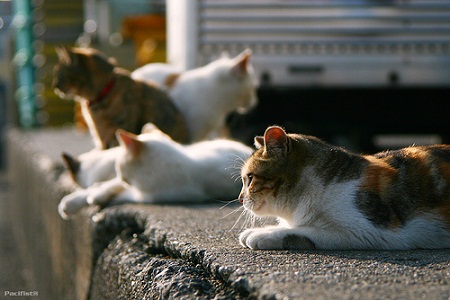TRAVEL
GUIDE
|
Maspalomas
Weather
Cats in the Canaries
There
is one certainty if you visit the Canary islands and that is that you
will see a cat within minutes of your arrival at your resort. Cats are
opportunistic animals and take advantage of the climate which allows
them to season and produce a litter 3 times a year, the generosity of
tourists and the abundance of leftover food, not to mention volcanic
soil that closely resembles cat litter. A single female, producing 2
females in each litter 3 times a year can give rise to a population of
22000 cats in 5 years.
The problem is compounded by visiting workers (often from the UK) who
"rescue" kittens and take them home but do not neuter them, creating a
stray cat problem in a complex where there wasn't one before. The still
common means of control is extermination by poisoning and drowning but
this is mostly ineffective because the death of the cats creates a
vacuum allowing new animals from the periphery to move in to the
complex. However a neutering programme, where animals die off slowly,
retains a slowly decreasing population that keeps newcomers at bay.
If you are confronted by strays in your hotel or complex there are two
important things. Firstly don't feed them in the apartments or
restaurants or any other busy area. This will encourage them to become
a nuisance to subsequent guests, resulting in complaints (and ruined
holidays for those with allergies). Feed them (only if they are
noticeably underweight) only at the designated feeding station or as
far away from the main thoroughfare as possible. Unfortunately the
excessive feeding of cats by tourists, beyond what they actually need,
gives rise to larger litter sizes and more and more unwanted kittens.
Don't approach the management with your concerns, even if you are
worried about their welfare, because this may be viewed as a complaint
and result in the implementation of an extermination programme; but
channel your report to a local animal protection group. Alternatively
on your return contact Animal Samaritans Abroad which is the
coordinating group of the only three UK charities that work in the
Canary Islands and ask them to pass on the information to a relevant
local group. The group will then make an approach to the hotel about
neutering programmes and advice on feeding points and the disposal of
rubbish in cat proof facilities.

If you do find newborn kittens in your hotel please leave them alone,
do not move them or rescue them. There is very little prospect for
rehoming animals in the Islands and they are best left alone while you
make a report to a local group. But don't be surprised if the local
group cannot help because they are already inundated. Remember that the
cost of buying food for a cat for your two week holiday could pay for a
cat to be neutered and treated for fleas and worms if donated to an
appropriate charity.
The contact numbers for Animal Samaritans Abroad for information about
cats in the Islands, to report a cat colony, for details of local
Canarian charities or to make a donation is as follows:
Tenerife:
Friends of the Ferals - Valerie Sinclair 01297 22838
Fuerteventura: Twinkle Trust - Jenny Billimore 020 8688 9870
Gran Canaria and Lanzarote: Kismet Account - Ian MacFarlaine
07734-104125
|
|






